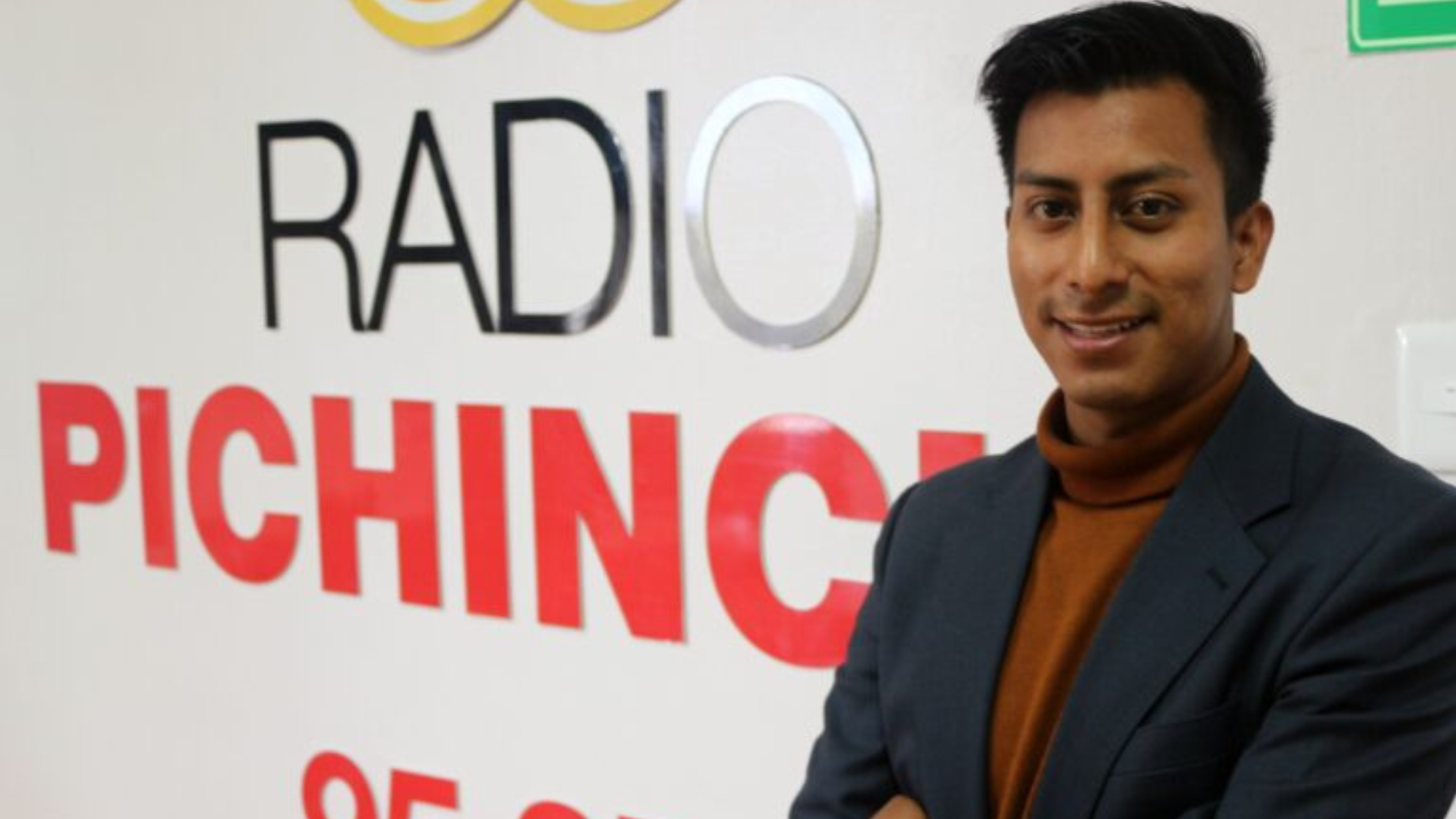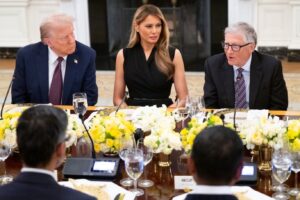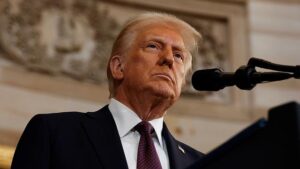
Published 08/26/2023 14:28 | Edited 08/27/2023 10:52
In an interview with journalist Leonardo Wexell Severo, from Comunicasul, the reporter from Rádio Pichincha, one of the most prestigious and popular in Ecuador, Bryan Paul Espinoza, talks about his participation in this alternative means of communication and points out that the vehicle constitutes “a voice which allows the opposition to the hegemonic discourse, not only of the traditional media, but also of the government’s own argumentative or ideological lines, especially of the last two, former president Moreno and the current one, Guillermo Lasso”.
For the journalist, the fact that the progressive Luísa González — candidate for president in Ecuador — started her campaign in the radio studios “is a very high point”.
Bryan reinforces the opinion of the candidate of the Citizen Revolution (RC) movement that Daniel Noboa, son of one of the richest men in Ecuador, represents continuity, a “Lasso 2.0”, with his policy of hunger and unemployment.
Follow the full interview.
What is the significance of Rádio Pichincha in the fight for the democratization of communication, in a country where the media is so concentrated?
Rádio Pichincha constitutes itself as the other word, as we say here, a voice that allows the opposition to the hegemonic discourse, not only of the traditional media, but also to the government’s own argumentative or ideological lines, especially the last two, the former president Moreno and the current one, Guillermo Lasso.
Our objective is to give space to the expressions of young people, feminist collectives, environmentalists, animal defenders, LGBTI, theater, culture, cinema and independent music groups. It was all these expressions that allowed Rádio Pichincha to become the channel it is. A vehicle for people to have a voice, which they cannot do in a traditional medium.
Do you believe there is symbolism in candidate Luísa González choosing Pichincha to start her campaign in the second round?
Clear. Most of the time, the mainstream media do not give space to contradictions, especially to the leaders and activists of the Citizen Revolution, or Correístas, as they are known, due to the framing of the information they want to maintain. The fact that Luísa started her campaign here is something relevant, a very high point, not only for the radio, but also for the people who listen to her, for her audience, the public that accompanies us, which is to whom we must provide accounts.
Read too: Union leader proposes unity to defeat the right in Ecuador
Could you give a brief summary of the oligarchy’s candidacies?
In addition to Noboa himself, who went through to the second round, most of the candidates, such as Jan Topic, owner of a security company [mercenários de elite] or Xavier Ervas [que ostenta em sua “biografia” ter colocado o brócolis equatoriano como “produto premium” em vários países] They are candidates of extremely high economic power. And also, enormous media power. Or Otto Sonnenholzner, who was a member of the Ecuadorian Association of Broadcasters.
In this daily struggle for truthful communication, who is the enemy to be fought?
I believe we are talking about Noboa, highlighted by Luisa González as a Lasso 2.0. I share this opinion, because he is a businessman, the son of Álvaro Noboa, who, if not the richest man in Ecuador, is one of the three richest. His banana companies gave him very important capital and that is where Daniel Noboa comes from. Thus, Noboa’s power causes him to also be compared to Guillermo Lasso. In this way, he maintains the same line as Lasso and follows his right-wing traits.
How does the Noboa family treat workers, how does it relate to its employees?
From what we know, there is a lot of outsourcing in Noboa companies, there is no affiliation with the Ecuadorian Institute of Social Security (IESS), they do not guarantee labor rights, they pay miserable salaries, they maintain contracts of around three or four months and then change companies, and So they continue to outsource, going round and round to circumvent legislation and increasing job insecurity.
During Correa’s government there was a commitment to democratization, with public vehicles serving the population. What is the current reality?
Public media were fundamental in democratizing culture and ideas in the country, in the most varied areas. This period of oxygenation lasted until 2019, during the Moreno government, with the liquidation of the public media company, which not only included Ecuador TV, but also public television and public radio.
This was a very strong blow to journalism. In Ecuador we went from being a public medium, which gave citizens a voice, which educated, as is one of the main roles of communication, to being commercial, another government channel, a small company. Broadcasters now have a commercial objective, when the objective should be to build and expand communication, ensuring that quality content reaches the entire national territory, allowing the population to grow.
How do you see the radio’s work from now on?
With rigor and respecting the principle of journalistic communication, which is to be for the people, to be with the people. Far from the tug of war between political interests and economic interests that want to dominate communication. It is necessary, therefore, to confront them in this way: with the true meaning of journalism, far from the political and economic interests that are behind the mass media, doing more polished public work, aimed at citizenship. Good journalism is what the people deserve, not falling into provocations or a media fight centered on the interests of this or that candidate, but helping the population to understand their work plans, giving them the necessary tools to understand who they are targeting. vote in this second round.
Because there is a lot to educate with our radio and this is its challenge and commitment: to raise awareness among people so that they take into account and reflect on the current situation in the country.
In this context of confrontation, what are the main mass means of disinformation and manipulation?
The hegemonic media, with greater economic power, openly act against Luisa González’s candidacy. They are Teleamazonas – linked to the second main bank in the country -, Ecuavisa and TC Televisão, which previously belonged to the Ecuadorian State. The three established a single line of argument, a hegemonic discourse full of hatred to continue polarizing the country, stigmatizing and demonizing socialism as an ideological current. And this is very harmful for people.
The result is that they end up inviting only right-wing, extremely conservative people to their programs. That’s what they did to elect Lasso and for that they are working in favor of Noboa.
These hegemonic means try to make people believe and seek to implant in the heads of workers and businesspeople that their reactionary discourse is the truth. This is how they try to make people look badly at a model that can bring progress for them and for the country.
Read too: Luisa Gonzalez could be the first woman president of Ecuador
Is the mainstream media manufacturing an artificial and harmful polarization contrary to national interests?
I believe that this polarization between Correismo and anti-Correísmo harms not only democracy, but Ecuador as a whole. It breaks with family, friendship and even romantic relationships. It is not a good thing for a country that is already too affected, bleeding a lot from high crime, poverty, inequality, lack of access to education, health, social security, a high rate of underemployment and unemployment. I believe that there are enough problems for us to have to endure political struggles that are not good for people.
And there are also millions of Ecuadorians who are gone…
Due to the severity of the crisis, so many people left. People who left and cannot return, because they were expelled by economic and insecurity conditions. We must add to this examples in the journalistic area, which is worth mentioning, the forced self-exile of professionals. There are four journalists who had to go into exile due to threats against their lives and their families. One of them, a friend of mine, had to leave us. Because this State does not guarantee life for anyone, not for journalists, not for presidential candidates, not for children murdered in the streets. This is a reality that needs to be changed. And now.
____________________________
CONTRIBUTE VIA PIX 10.511.324/0001-48
Agência ComunicaSul is covering the presidential elections and the National Assembly of Ecuador thanks to the support of the following entities: newspaper Hora do Povo, Diálogos do Sul, Barão de Itararé, Portal Vermelho, Correio da Cidadania, Agência Saiba Mais, Intersindical, Central dos Trabalhadores and Workers of Brazil (CTB), Central Única dos Trabalhadores do Paraná (CUT-PR); Association of Social Workers and Psychologists of the Court of Justice of the State of São Paulo (AASPTJ-SP), Federation of Workers in Credit Companies of Paraná (FETEC-PR), Unions of Workers in Water, Waste and the Environment of the State of São Paulo (Sintaema-SP) and Santa Catarina (Sintaema-SC), Union of Workers in Heavy Construction Industries in the State of Paraná (Sintrapav-PR), Union of Official Education Teachers of the State of São Paulo ( Apeoesp Sudeste-Centro), Writers’ Union in the State of São Paulo, Workers’ Union in the Federal Judiciary of Santa Catarina (Sintrajusc-SC); Union of Workers in the Judiciary of the State of Santa Catarina (Sinjusc-SC), Union of Workers of the Federal Judiciary in Pernambuco (Sintrajuf-PE), popular mandate from councilor Werner Rempel (Santa Maria-RS) and dozens of individual contributions.
Source: vermelho.org.br

